

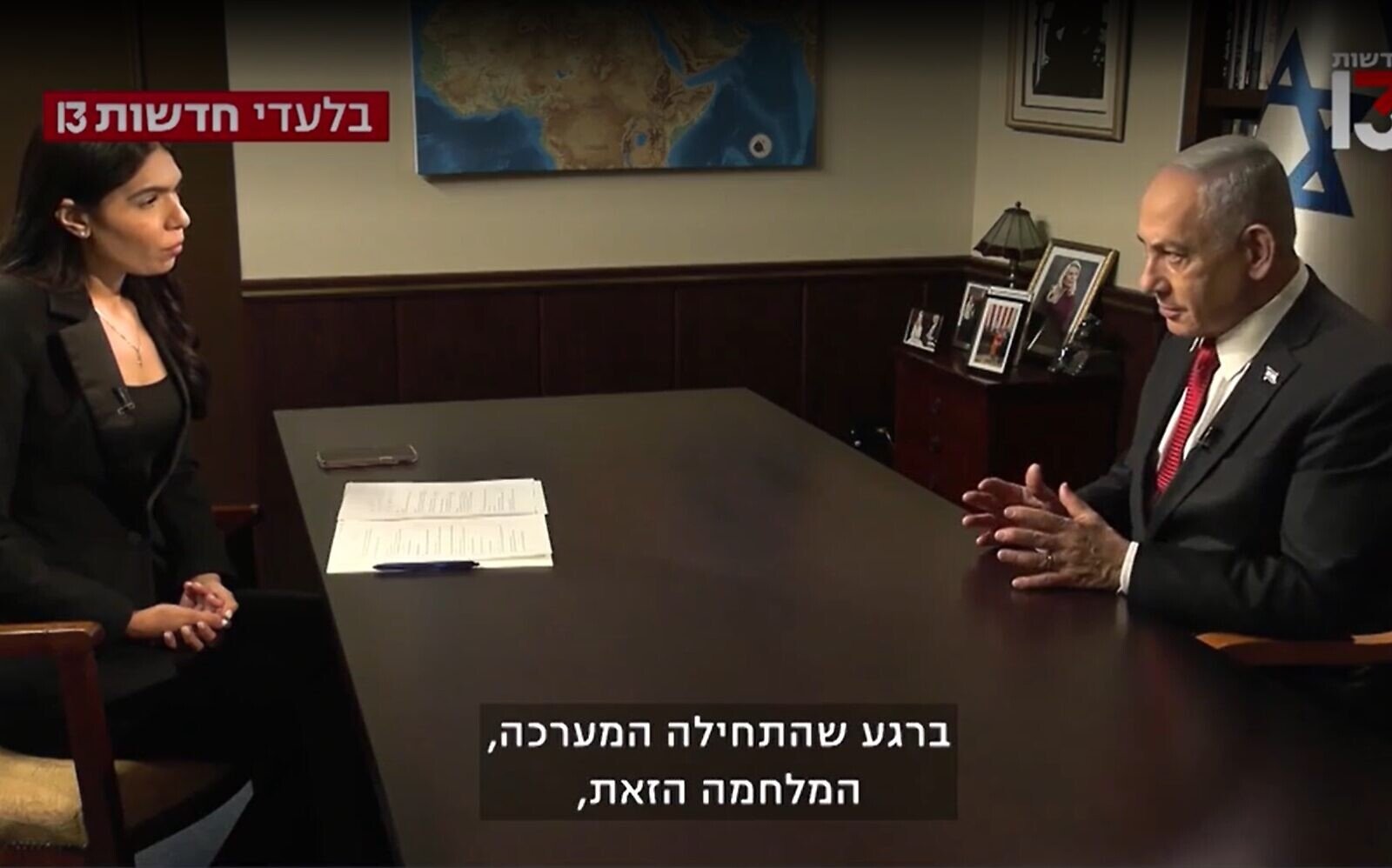
Prime Minister Benjamin Netanyahu rejected the claim that he’s prolonging the war in Gaza for political purposes, calling the accusation “malicious and false.”
Netanyahu made the remark to Channel 13, in a rare interview with an Israeli press outlet that isn’t seen as staunchly in his corner. The Channel 13 interview, a clip of which aired Sunday night, is part of a longer piece the channel is doing on the government’s internal minutes from June’s 12-day war with Iran. But it touched on the ongoing Gaza war, which Netanyahu framed as an element of Israel’s larger fight with a pro-Iranian regional axis.
The interview, which will air in full on Tuesday, comes as notes of discontent continue to reportedly emerge from IDF Chief of Staff Eyal Zamir, and as the mother of an Israeli hostage held by Hamas in Gaza expressed fear that the terror group is using her son as a human shield.
In the roughly two-and-a-half-minute clip, correspondent Moriah Asraf asks Netanyahu whether the short duration of the Iran war indicates that he could have ended the Gaza war earlier, had he wanted to. Polls have shown that most Israelis feel the prime minister’s decision-making in the war is driven by personal or political considerations.
“This question and its premise are malicious and also false,” Netanyahu answered.
The prime minister went on to compare the Gaza war to fighting in the Iraqi city of Fallujah, claiming that the IDF’s combat in Gaza is being handled more efficiently.
“How long did it take to win in Fallujah? Nine months,” he said. “For nine months, the whole world took on 3,000 terrorists in a place that is far less complex than Gaza. So first of all, I think we are doing it faster than all those armies combined, under much more difficult conditions.”
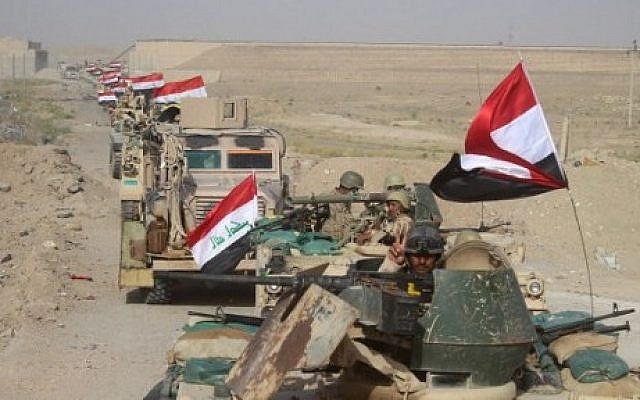
What Netanyahu was referring to is unclear. The US’s Iraq War in 2004 saw two separate battles in Fallujah that took place months apart and each lasted several weeks. In 2016, Iraqi forces, with the support of the US and other countries, recaptured the city from ISIS after a roughly four-month siege, as part of a larger war against the terror group.
He also said the presence of Israeli hostages, and what he called inconsistent support from the former Biden administration in the US, have made the fighting more complicated.
“Second, we are conducting this war with challenges that nobody else has,” he said. “This is a war, first of all, with hostages. When there are hostages, you are careful, you do ceasefires.”
He continued, “Third, you had an American administration that, after a few weeks of unreserved support, started not only having reservations, but also blocking us,” a reference to former US president Joe Biden’s approach to the war, which Netanyahu has repeatedly criticized. He acknowledged that the current president, Donald Trump, has been more unabashedly supportive of the war.
The interview was notable because Channel 13 frequently airs criticism of Netanyahu. The prime minister has spoken frequently to international media. But in another recent question-and-answer with an Israeli channel, i24, for example, the interviewer presented him with a gift.
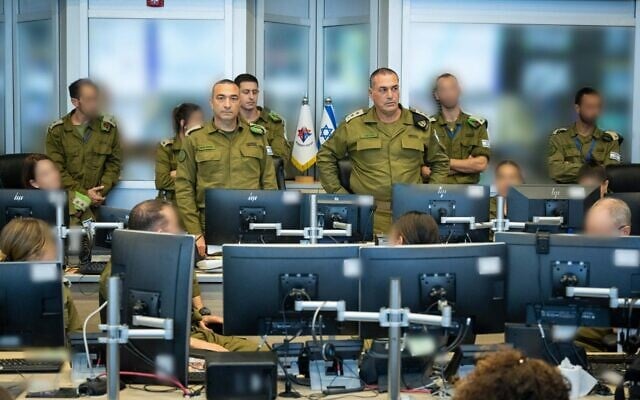
Netanyahu gave the interview on the eve of an impending Israeli offensive to conquer Gaza City, which he has described as Hamas’ last stronghold. But on Sunday, Channel 12 reported that Zamir told Israeli leaders the Gaza terror group will survive the offensive, which he reportedly opposed earlier this year as it was being discussed.
“We are obligated to the goals of the war as determined by the cabinet, but Hamas’ military and government will not be defeated after the operation to capture Gaza City,” Channel 12 quoted the chief of staff as saying, without citing sources.
Zamir also told lawmakers on the Knesset Subcommittee for Intelligence and Secret Services that Netanyahu has left the military in the dark regarding the next stages of the war following the Gaza City offensive, according to reported comments leaked to the Ynet news site.
“The prime minister is not telling us what comes next, we don’t know what to prepare for,” Zamir is quoted as telling the subcommittee’s members during a closed-door briefing on Friday, echoing comments he is reported to have made in cabinet meetings as well. “If they want a military government, then they should say military government.”
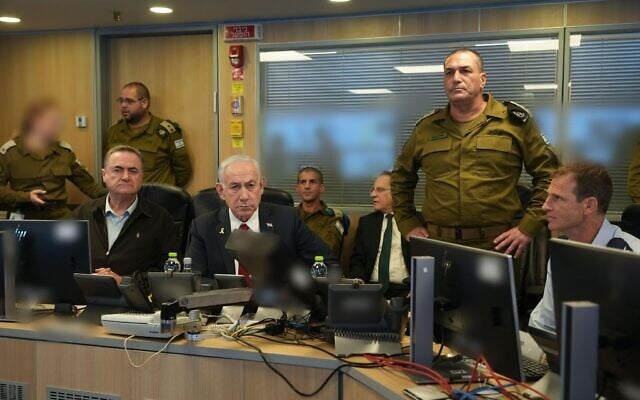
Most Israelis, according to surveys, favor a deal to release the 48 hostages held by Hamas and end the war. Particularly strong opposition to the Gaza City plan has come from families of hostages, some 20 of whom are thought to still be alive.
On Sunday, the mother of Hamas hostage Guy Gilboa-Dalal said she has been informed that her son is being held above ground in Gaza City, after the terror group published a video of him last week in which he was in the backseat of a car.
Speaking to Army Radio, Meirav Gilboa-Dalal said she received confirmation that he is being held alone and is being used as a “human shield” by his Hamas captors ahead of an impending IDF operation to capture the city. She did not say who she received the information from.
“I have reached rock bottom,” she said, recalling that she had thought things could not get any worse after Hamas published a video back in February of Gilboa-Dalal and fellow hostage Evyatar David being forced to watch a group of hostages get released. “And today I know that my son is a human shield. And to find out that your son is a human shield — that is rock bottom.”
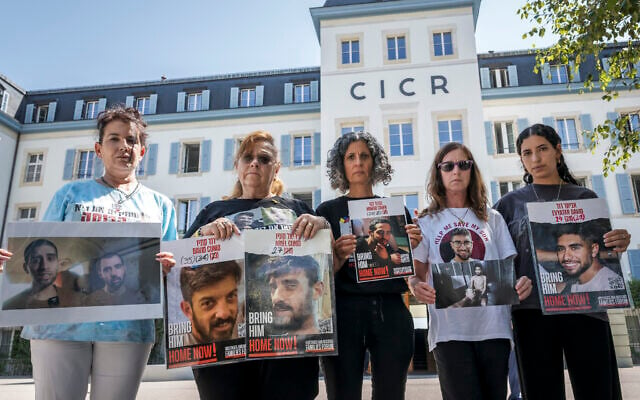
In his interview with Channel 13, Netanyahu portrayed the war in Gaza as one piece of a larger fight against Iran and its proxies
“The moment this war began, I said on its second day that we would change the face of the Middle East,” he said.
“We are not only fighting Hamas — we are fighting the whole Iranian axis, of which Hamas is only one part,” he added. “And we eliminated the axis’s components, one by one. First of all, we tended to Hamas, we had to enter Rafah and take control of the Philadelphi [Corridor], then move to [Israel’s] north and do the pager [operation] and eliminate Hezbollah and advance, and as a result, [Syrian dictator Bashar] Assad fell. All these stages essentially dismantled the Iranian axis, which was preparing to eliminate Israel.”
He said that the war in Gaza was nearing its end, the latest of several times over the course of the fighting that he’s made that claim.
“What happened was, we didn’t only need to defeat Hamas — we needed to defeat the entire Iranian axis, including a war with Iran itself,” he said. “So I think that we are now in the decisive stage. What started in Gaza will end in Gaza.”

